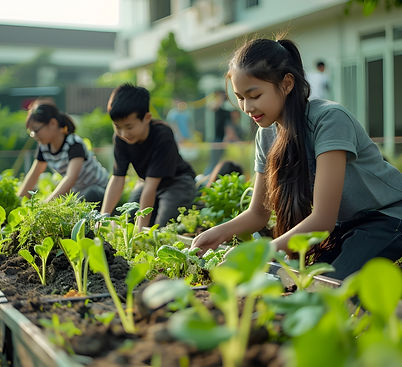honoring the seasons of childhood

Waldorf Principles
On this page you will find a more in depth explanation about basic core principles of a Waldorf education that sets the pedagogy apart.
"Knowing that you love the earth changes you, activates you to defend and protect and celebrate. But when you feel that the earth loves you in return, that feeling transforms the relationship from a one-way street into a sacred bond. The land is the real teacher. All we need as students is mindfulness.”
Robin Kimmerer

"We can find Nature outside us only if we have first learned to know her within us"
Steiner
Connection with Nature
Many of these great habits can be learned and practiced when children connect with nature and realize they are stewards of this beautiful earth and all things in it. Steiner saw humans and nature as interdependent and mutually evolving, with humans playing a unique and important role in the evolution of the natural world around us. So what is that role going to be? What direction is the natural world around us going to evolve?
Experiencing for themselves and taking on responsibilities for tasks and steps in the processes and cycles that supply many of the child's needs, for example the farm to table food cycle, will change their attitude toward the food they eat. The processes and steps to make clothing, furniture, toys, to have a clean area are all great opportunities to help our children learn to see the world and people around them through lenses of appreciation, reciprocity, and community. Focusing on the process allows opportunities for children to learn many skills to help them through life such as teamwork, serving, positive attitudes, patiences, love for the effort that goes into the task, the feeling of satisfaction and accomplishment after a "job well done."
Robin Kimmerer in her book “Braiding Sweetgrass” stated, “People often ask me what one thing I would recommend to restore relationship between land and people. My answer is almost always, “Plant a garden.” It’s good for the health of the earth and it’s good for the health of people. A garden is a nursery for nurturing connection, the soil for cultivation of practical reverence. And its power goes far beyond the garden gate—once you develop a relationship with a little patch of earth, it becomes a seed itself. Something essential happens in a vegetable garden.”
Steiner emphasised “Our highest endeavor must be to develop free human beings who are able of themselves to impart purpose and direction to their lives. The need for imagination, a sense of truth, and a feeling of responsibility – these three forces are the very nerve of education.” We create that feeling of responsibility by allowing children the chance to contribute to the daily tasks for what it takes for the school to function through daily chores, by gardening, caring for animals, cooking, sewing, knitting, woodworking, and more.
Many years after the beginning of Waldorf education, an ongoing Harvard research study has shown there is a strong connection between doing these daily chores and learning to take care of things, ie. pets, household items, plants, etc. to later professional success and happiness. These shared responsibilities or steward over tasks help develop greater self-worth, confidence, work ethic and empathy for others. Tying these responsibilities to the natural world we live in will help our children be more confident in their role in shaping the world around us and for the future.
Get in Touch
Click on the links to the side to fill out a brief form to be able to stay update with news, events, and ways to contribute.

